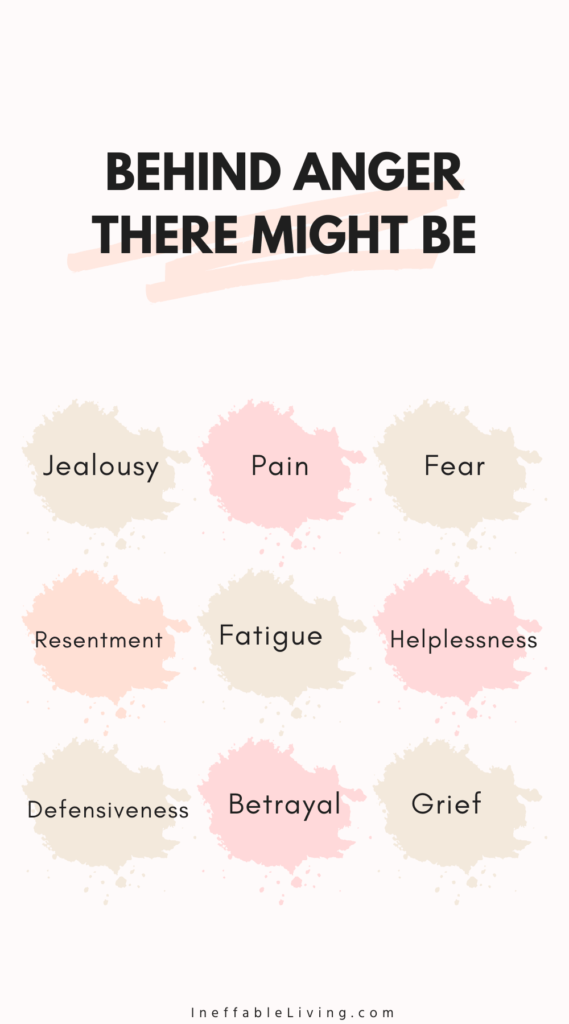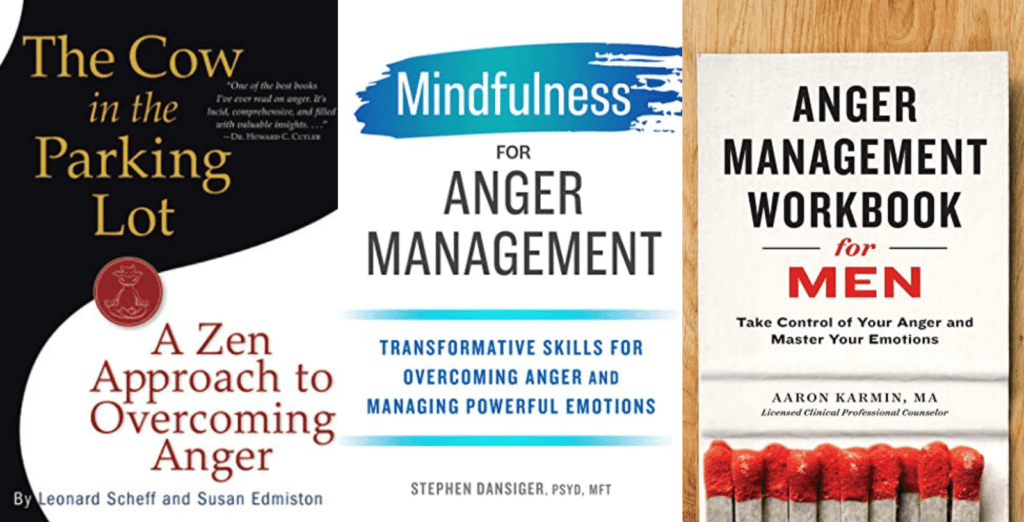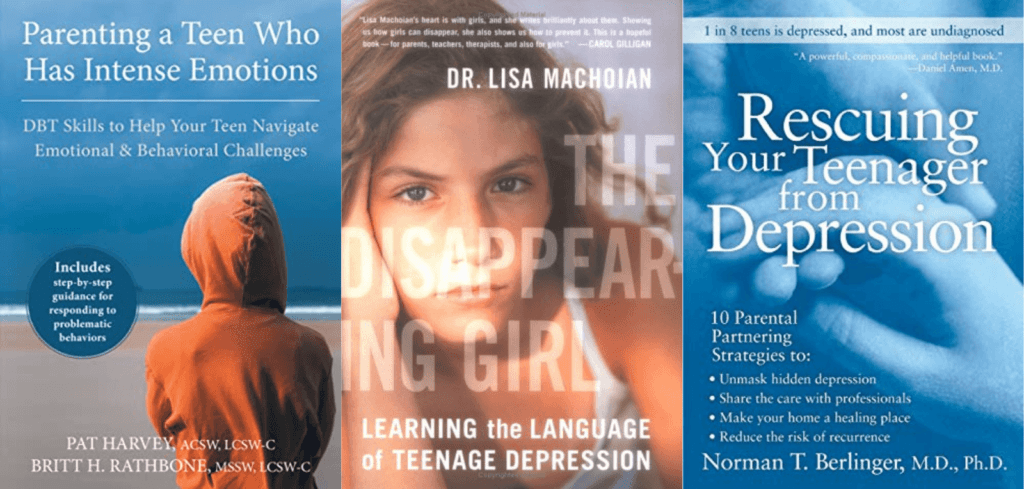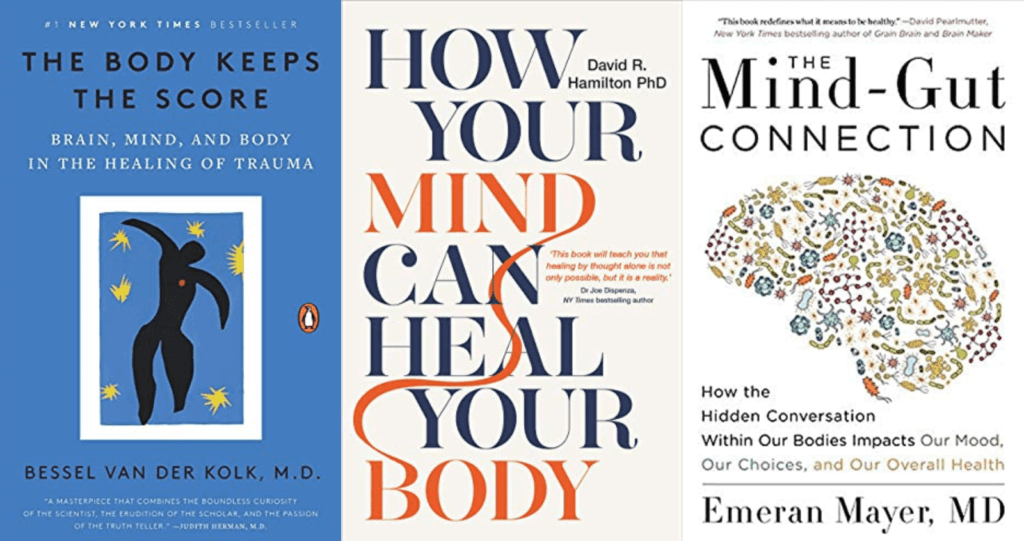The following are some of the best anger management books and workbooks to help you cope with your difficult emotions.
Disclosure: Some of the links below are affiliate links. This means that, at zero cost to you, I will earn an affiliate commission if you click through the link and finalize a purchase.
Best Anger Management Books

1. Cow in the Parking Lot
By Leonard Scheff, Susan Edmiston
The authors show how, once we identify our real unmet demands, we can dissolve the anger. The same is true for our “buttons”—once we understand them, we can defuse what happens when they’re pushed.
We learn to laugh at ourselves, a critical early step in changing angry behavior. We learn how to deal with the anger of others, and ultimately how to transform anger into compassion.
And finally, we learn the liberating truth: Only you can make yourself angry.
Related: Top 14 CBT Exercise For Anger Management (+FREE Anger Worksheets)

2. Rage: A Step-by-Step Guide to Overcoming Explosive Anger
By Ronald Potter-Efron MSW PhD
In classic Potter-Efron style, the book places the responsibility for control squarely on the shoulders of the angry individual. There is no room in this dangerous situation for whys and becauses. Instead, Rage offers no-nonsense, step-by-step anger management tools that really work.
Related: Top 15 Anger Journal Prompts (+FREE Worksheets)

3. Mindfulness for Anger Management
By Stephen Dansiger PsyD MFT
Mindfulness for Anger Management helps you recycle angry energy, see it for what it is, and allow you to manage anger and other difficult emotions with:
- An introduction to anger management that defines different kinds of anger from frustration and annoyance to aggression and rage, and includes self-assessments to measure your personal anger level.
- Practical exercises that combine evidence-based emotion regulation techniques with mindfulness skills in self-assessments, checklists, and reflective prompts to equip you to handle anger when it strikes.
- Real-world applications that focus on how anger affects life, including work, relationships, and personal well-being.
Related: Top 70 Detachment Quotes To Help You Let Go

4. Anger Management for Parents
By Vivian Foster
In Anger Management for Parents, you’ll discover:
- A deep dive into the origins of our anger — why we feel it, how it benefits us, and where it completely destroys our lives
- Why most of the time it’s not actually your child’s fault — and how you can use this awareness to empower healthy relations between the two of you
- The most effective way to remove yourself from your emotions before they take control of your actions
- Powerful and actionable steps to help you establish better communication between you and your child
- Important things to do when setting healthy boundaries for your little one to follow
- Detailed instructions for following the super-successful “traffic light system” to help your kids identify their emotions and control their anger
- How your child is simply a mirror of you — and how you can use this understanding to better yourself and your child’s development
- Powerful strategies to show your child that you love and support them, encouraging healthier behavior in every action they take
… and much more!
Related: Best 7 Books On Detachment

Best Anger Management Workbooks

5. The Anger Management Workbook for Women
By Julie Catalano MSW LICSW
This book about anger management for women includes:
- Interactive exercises―Explore worksheets, quizzes, and other activities for assessing negative behavior patterns and discovering how your mind perceives and responds to anger.
- In-the-moment techniques―Change your mental and physical reaction to anger-provoking thoughts and situations with strategies you can use in real time.
- Other women’s stories―Read compelling stories about other women who have used these techniques to overcome their anger management issues.
Related: Best 6 Ways to Let Go of Wanting to Control Everything

6. The Cognitive Behavioral Workbook for Anger
By William J. Knaus EdD
Drawing on the gold standard treatment for anger—cognitive behavioral therapy (CBT)—and informed by the no-nonsense approach of rational emotive behavior therapy (REBT), this workbook is chock-full of powerful tools, exercises, and self-assessments to help you overcome destructive anger, once and for all.

7. Anger Management Workbook for Men
By Aaron Karmin LCPC
The Anger Management Workbook for Men goes beyond why men get angry and helps you get to the root of your anger by including:
- Invaluable information and assessments to help evaluate your anger
- Concrete examples of productively expressing anger
- Clinical examples of anger management strategies
Related: Best 10 Books On Being Assertive

8. The Anger Management Workbook for Women
By Victoria Tyler
This book covers these and many more valuable topics:
– Learning to manage anger effectively
– Exploration of the problem behavior which led to arrest/ticket/referral
– Developing self-control over thoughts and actions
– How to receive positive support from others
– Expressing feelings appropriately
– Anger management plan

9. Women’s Anger Management Workbook
By Little Victories
This workbook will show you exactly how you can do that. Inside, you will discover:
- Concrete, proven methods to channel your anger in positive ways that bring about the outcomes you are seeking
- Helpful ways to identify your triggers and different strategies to use when you triggers cannot be avoided
- How to get to the root cause of your anger and deal with your underlying emotions – which are almost never really anger
- Signs of hormonal imbalances that may be causing you a harder time managing your emotions
- The importance of self-care and ways you can transform your life today to take better care of yourself
- How to be an effective communicator, including information on dealing with difficult people and expressing yourself without anger
- What it means to be mindful and various mindfulness techniques to employ to combat your anger
- Cognitive Behavioral Therapy (CBT) techniques to use along with a proven CBT approach to defusing your anger
- Simple, achievable exercises to help you analyze your anger and adjust your responses to outside stimuli when needed
And much more!

How Anger Management Books Can Help
Anger management books can be incredibly helpful in various ways. Here are a few ways they can assist you:
1. Understanding your anger: Anger management books provide insights into the nature of anger, including its triggers, causes, and consequences. They help you gain a better understanding of how anger affects your thoughts, emotions, and behaviors.
2. Learning techniques and strategies: These books offer practical techniques and strategies to manage anger effectively. They teach you how to identify early warning signs of anger and provide tools to calm yourself down before it escalates. By learning these skills, you can prevent destructive outbursts and find healthier ways to cope with anger.
3. Improving communication skills: Anger often leads to poor communication, damaged relationships, and misunderstandings. Anger management books teach you effective communication techniques, such as active listening, assertiveness, and empathy, which can help you express your anger in a healthy and constructive manner.
4. Managing stress and triggers: Anger management books provide guidance on managing stress, as stress often contributes to anger. These books teach you how to identify and cope with triggers that provoke your anger, helping you develop healthier responses to challenging situations.
5. Enhancing self-awareness: Understanding yourself and your emotions is crucial for anger management. Books on this topic can help you develop self-awareness by exploring underlying issues that may contribute to your anger, such as past traumas, unmet needs, or unrealistic expectations.
6. Inspiring personal growth: Anger management books often encourage personal growth and self-reflection. They offer exercises, journaling prompts, and mindfulness practices to help you cultivate emotional intelligence, empathy, and resilience. By engaging in these activities, you can not only manage your anger but also grow as an individual.
Conclusion
Remember, these books serve as guides, but the actual change happens through consistent practice and application of the strategies provided.



